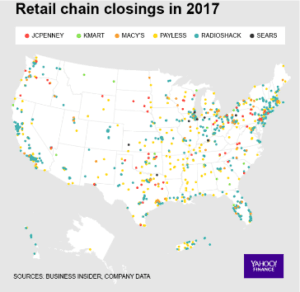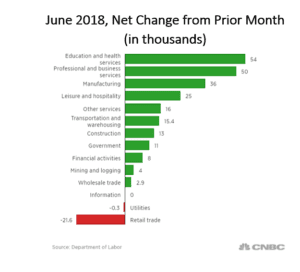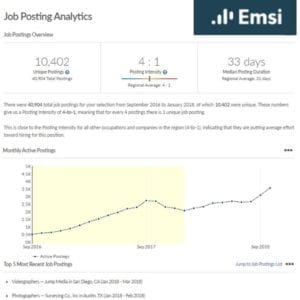Giving Thanks for the New Economy
With the holidays near, we need to give thanks for the many opportunities that 2019 should provide to higher education. The next few years (including 2019) bring the promise of a new and exciting economy, one based heavily on automation and efficiencies and fueled by the once-mocked Millennials (born between 1980 and 1996; now roughly 22 to 38 years of age) and the special people of Generation Z (or the iGeneration segment, born between 1997 and 2002 and now 16 to 21 years of age). By 2020, Millennials and Generation Zers will represent more than half of the workforce. By 2030, more than two-thirds of the workforce will be from these two cohorts[i].

The new economy and movement to e-commerce will continue to rattle the brick-and-mortar business of retail. As big-box retailers like Walmart (through Jet.com), Target, and Best Buy, among others, redefine their e-commerce against the likes of Amazon, new opportunities will persist as retailers continue to shutter their retail outlets. In 2017, nearly 8,000 stores closed[ii] and another 4,000+ are estimated to close in 2018[iii]. This follows on the heels of 5,077 store closures in 2015 and 2,056 in 2016[iv]. Low unemployment and growth across several sectors absorbed many losing their jobs in retail. A strong economy saw health services, professional and business services, manufacturing, and the leisure and hospitality segment absorb those losing jobs to more online retail[v]. 
Many industries are forecast to change rapidly over the next few years. Higher education providers can seize the opportunity to provide more educational credentials through more aggressive engagement with those who will ultimately fuel the new economy. Or, they can let others–such as business and industry–build their own programs, and allow more Massive Online Open Courses (MOOCs) and micro-credentials cut into the value of their larger and potentially unwieldy degrees.
One solution has been to create more full degrees online, with a heavy emphasis on professional master’s degrees. While this is certain to extend the life cycle of the bachelor’s and master’s degree, especially in the Science, Technology, Engineering, and Math (STEM) fields, the pipeline to serve the new economy will remain unfilled as employers will need more progressive supply chain managers, programmers and coders, data and intelligence analysts, drone operators, cybersecurity experts, home health professionals, alternative energy workers, and so many others.
 A quick environmental scan shows the following forecasts, developments, and observations:
A quick environmental scan shows the following forecasts, developments, and observations:
- Solar installers will grow by 105% by 2026, going from 11,300 installers in 2016 to 23,100 in 2026[vi]. The Bureau of Labor Statistics also shows that wind turbine service technicians will also increase by 96% during that time, as should many other renewable energy-related occupations.
- Emsi data shows more than 10,000 unique job postings with the keyword “drone” in them, as well as monthly increases of active job postings with the same word[vii]. Drones will be used by first responders, photographers, security personnel, and agricultural specialists, and will also benefit from expected growth in the construction and building sectors within the United States, many of which are a result of weather disasters, new engineering and transportation projects, and the growth in commercial real estate.
- In addition to the transportation of goods from warehouses directly to the customer, the transportation of people is destined for change. Young people are choosing not to make larger purchases, automobiles included, and have bought into the sharing economy. These consumers are also fueling a movement to alternative and convenient forms of transportation. For example, General Motors (GM) recently announced layoffs, acknowledging the movement to self-driving and electric cars. As a result, a new workforce is needed, and new talent will be recruited to follow this trend. Also, GM announced plans for an electric bike[viii] to further meet the needs of Generation Zers and Millennials. Ford quickly followed suit by acquiring an electric scooter company[ix]. Further disruption is also forecasted in the already disrupted mobility sector as Google’s subsidiary Waymo plans to launch a self-driving taxi or ride-hailing service in 2019[x]. With approximately two million Uber drivers[xi] and nearly four million Lyft drivers worldwide,[xii] Waymo, as well as Uber’s future self-driving ride-hailing service, will further disrupt the industry.
While these are just a few industries experiencing rapid change, higher education has an opportunity to be a more active partner in creating the future. I believe that higher education still feels that it is the hub of all things education. In reality, it continues to maintain a strong hold on many credentials related to STEM and business education, but has lost its grip on much of what it had. Highly bureaucratic and slow-moving approval processes coupled with changing content has put colleges and universities at a disadvantage in the new economy. More and more degrees appear to have grown obsolete, with colleges and universities choosing to ignore them rather than fix them through certificate refreshers that often come in a noncredit format.
Where higher education has adapted is with online degrees, but that took nearly a decade to see scaled adoption. Also, the supply of degreed online education may soon exceed demand unless institutions start creating content and credentials, like badges and certificates, that are better suited for the new economy.
For the new economy, higher education can focus on badges and certificates and other micro-credentials that may be better suited for these changes; educating those migrating from retail to new industries; retraining those with obsolete degrees of decades past; and appealing to generations that received more frequent awards and rewards as they matured.
Higher education can do a reset by reviewing its existing portfolio for relevance, designing new programs and credentials for jobs already evolving in the new economy, and creating new and nimble processes that qualify and validate new curriculum for new jobs. For this opportunity, we should give thanks.
[i] WSJ/Deloitte CFO Insights, March 2018
[ii] Yahoo Finance, January 8, 2018
[iii] BusinessInsider, April 7, 2018
[iv] Credit Suisse Report, 2017.
[v] CNBC report and June Department of Labor Report, June 2018
[vi] Bureau of Labor Statistics, 2016 National Employment Matrix
[vii] EMSI Job Analyst
[viii] Automotive News, November 2, 2018
[ix] USA Today, November 13, 2018
[x] New York Post, November 14, 2018
[xi] Garrett Camp (Uber Co-founder) blog, June 20, 2017
[xii] CNet, January 16, 2018
Learn more about UPCEA's expert consultants.
Do you need help with your PCO unit or campus? We can help. Contact UPCEA Research and Consulting for a brief consult. Email [email protected] or call us at 202-659-3130.
Trusted by the nation's top colleges and universities, UPCEA Research and Consulting provides the best value in the industry today. UPCEA's industry experts have years of experience in Online and Professional Continuing education - put them to work for you!
UPCEA Research and Consulting offers a variety of custom research and consulting options through an outcomes-focused pricing model. Find the option(s) that best suit your institution.
Learn more about UPCEA Research & Consulting
The UPCEA Difference
Unmatched Experience: For more than 100 years, UPCEA consultants have exclusively served the needs of online and professional continuing education programs. UPCEA consultants leverage their extensive industry expertise to expedite solutions, anticipate upcoming shifts, and offer distinct best practices, effectively aiding clients in achieving their goals.
Cost Effectiveness: As a nonprofit, member-serving organization, we provide unmatched value, allowing you to maximize limited research and consulting budgets.
Action in Motion: Our cadre of experienced, skilled authorities and expert practitioners propels you forward, translating research and consulting into impactful implementation, a distinctive hallmark of UPCEA. Our team of current and former institutional leaders will support you, turning research and consulting into action.
Mission Alignment: Like you, our mission is to enhance and expand educational opportunities and outcomes for adult and other non-traditional learners. We share your values and work in partnership with you to advance access and excellence in education.
